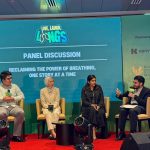Last month, I wrote[NB1] about the growing cancer crisis among younger people, especially women. While Malaysia has not yet mirrored the global surge, we would be short-sighted to assume that we are in the clear. But instead of sounding the alarm again, let’s talk about the next step: How do we respond? Because here is what I have come to believe loudly and clearly: We can’t keep putting all the responsibility on individuals: “Eat better. Move more. Don’t smoke. Drink less”
Sure, these are important. But when the environment around us is working against these goals, when the healthier choice is also the hardest one, we are setting people up to fail.
Take a good look around our country. Ultra-processed foods are cheaper and easier to find than fresh produce. Safe spaces for exercise are few and far between. E-cigarettes that were once regulated are now everywhere and worryingly popular among teens. In other words, if we want people to make better choices, we need to make better choices easier.
That means shifting the focus from personal responsibility to shared responsibility, starting with policymakers, urban planners, employers and industry regulators. The World Cancer Research Fund (WCRF)’s Policy Blueprint[NB2] offers a roadmap worth paying attention to. It outlines bold, evidence-based actions that can help entire populations reduce cancer risk. Here are a few that Malaysia should seriously consider.
Let’s start with vaping. In 2023, nicotine was removed from the Poisons Act and ever since, flavoured e-cigarettes have flooded the market. They are designed to appeal to young people, especially girls, with fun flavours, bright packaging and influencer-style marketing. It is the ‘candy cigarette’ of the 2020s. We urgently need tighter rules, stronger enforcement and efforts to keep commercial interests from watering down public health policies. If we could be tough on tobacco, we can and should be just as tough on vaping.
Alcohol is another area where action is needed. Ask most people what cancer is linked to alcohol, and they will likely say liver. Few realize that even moderate drinking increases the risk of breast and colorectal cancers. High alcohol taxes in Malaysia are a step in the right direction. But we could go further, such as requiring cancer warning labels on alcohol packaging as Ireland has done. It is a simple step that could change how people think about drinking, especially as part of regular social life.
Ultra-processed foods are a major concern too. Kids are bombarded with ads for fast food, snacks and sugary drinks from the moment they go online. The WCRF calls for marketing restrictions on unhealthy foods, especially those targeting children. That is not about banning treats, it’s about giving kids a fighting chance to grow up healthy. Malaysia could follow countries like Chile, where warning labels on food and drink helped reduce sugary drink sales by nearly a quarter in two years.
Even the most motivated person cannot exercise if there is nowhere to walk or cycle safely. And who wants to take public transport if it is unreliable and unpleasant? Urban design matters. So does public transport. Cities like Copenhagen did not magically become healthier; they invested in infrastructure that made active living part of daily life. Cleaner air, safer roads and more physical movement all reduce cancer risk.
The average adult spends more than one-third of their day at work. That makes the workplace a powerful place to encourage or discourage health. Employers can help by offering time off for health screenings, supporting smoke-free campuses, promoting walking or public transport to work, and replacing one-off health talks with real wellness programs. And let’s retire smoking rooms already!! Yes, we still have large corporate companies offering smoking spaces. They are outdated and completely out of sync with modern health goals.
Finally, we need to address the role of industry. We have seen what happens when powerful industries get a seat at the public health table. Regulations stall, loopholes appear, and people pay the price. Countries like Mexico and Chile pushed back, implementing taxes, warning labels, and real transparency. The result? Lower consumption of harmful products and more public awareness. Malaysia must do the same. Public health policies should be shaped by science, not by lobbyists.
In sum, telling people to “just make better choices” misses the point. You cannot choose what to eat if healthy options are out of reach. You cannot choose to walk or cycle if it is not safe. You cannot make informed decisions if products hide their risks. If we want to protect future generations from a cancer crisis, we need to fix the system and not just point fingers. The healthier choice should also be the easier, cheaper and more obvious one. So, let’s build a Malaysia where that’s actually possible!
[NB1]https://cancermatters.cancer.org.my/2025/03/06/younger-people-are-facing-a-growing-cancer-crisis/
[NB2]https://www.wcrf.org/research-policy/policy/blueprint-for-cancer-prevention/






